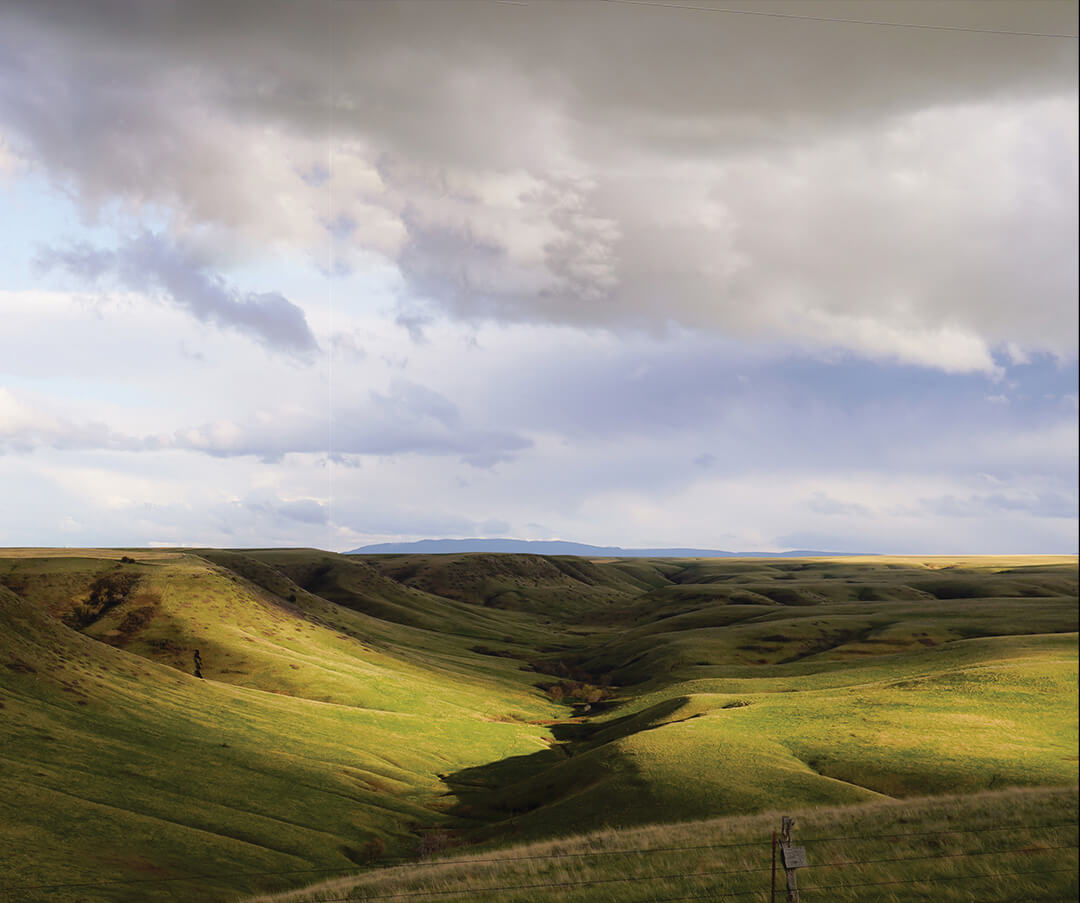
24 Nov Old West, New West
Editor’s Note: The Winter 2023 issue closes Big Sky Journal’s 30th anniversary. In recognition of this passage of time, the editors turned back to stories published in the magazine’s first issue, reflecting on historic themes and storytelling in the West. Award-winning author William Kittredge [1932 – 2020] was among the stable of writers published in the magazine’s early years. Often considered a preeminent voice of the American West, Kittredge co-produced A River Runs Through It, taught literature at the University of Montana, published numerous books and essays, and received a Stegner Fellowship at Stanford — all the while offering resolute insight into what it means to live in the West. In this essay, originally published in the Spring 1994 issue, Kittredge takes a close look at how the West came to be. He reflects on his witnessing of a New West and points out challenges our communities continue to grapple with today. With candor and a good dose of humility, Kittredge dispels the myth of the West and uncovers an oft forgotten truth: Hope rests in taking care of community and making good use of what we’ve already got.
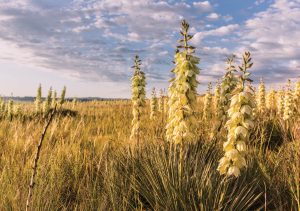
After consistent and above average spring rain, a yucca superbloom covers the prairie in Rosebud County, Montana.
Some of us dream we are witnessing the birth of a heartland nation in the American West, an empire that runs down the spine of the continent from the blue Canadian Rockies to the cowboy kingdoms of Wyoming and the Colorado plateau and beyond to the ski-lift highlands above Durango and Santa Fe, at the edge of the southwestern deserts where the Hopi and citizens at Acoma built their cities on the mesa-tops (in the sky), which reminds us of how good we could be.
In 1805, one of our first wayfarers in the West, Meriwether Lewis, sat beguiled beside the thunderous falls of the Missouri River (since dammed for hydroelectric power) and told himself this West was not only the great useful place Jefferson had instructed him to discover — a treasure for the republic — but also sublime, by which he likely meant it reeked of obscurity, privation, vacuity, solitude, silence, boundlessness, and, thus, of almost infinite possibility. As it still sort of does.
It was a sweet day and I thought, as I drove along the Wind River, of fishing. Autumn is such a fine time to make your careful way across a meadow, along little trails through willows, to crouch on the sodded bank just back from the stream, trying to catch a trout on a fly. But over dinner on an outdoor patio in Jackson, Wyoming, a perfect moon hanging amid clusters of stars over the mountains, I heard about the problem with teenaged suicides on the Wind River Indian Reservation.
The color emptied from perfection in the eye of my mind, glory fading. The West is a candy-apple kingdom if you have meaningful work, if you are economically OK at a reasonable level and are secure to enjoy it — which means, as often as not, if your money comes from outside the region.
The West was a place where good people could come to escape the injustices of an old world. The park-like valleys between shining mountains and the wetland enclaves out in the vast sagebrush and lava-rock distances were, for some decades, refuge for enormous migrations of the oppressed from Europe and (despite racism) from Asia. Families could come find communities in which to farm, vote, tend the hardware store, raise children, and pray to God. The West was where opportunity lived — and freedom, if you were tough enough.
But the West was also an extraction colony to be worked, where the strong could grow rich. Fur trappers, miners, ranchers, and loggers came wave after wave, intent on making a killing. They dug holes in the earth, cut the ancient trees for lumber to build towns, killed off the wild animals so they could replace them with grazing herds, plowed up prairies, dammed rivers, pumped the aquifers dry, and waged genocidal warfare against Native populations.
Such adventurers were ruthless, driven by greed, and they were the heroes in the mythology of The Western: a racist, sexist legend of conquest designed to reveal violence — poisoning the badger, strapping on guns, building the great dam — as a way of ultimately solving problems.
Our heroes accumulated money and power and were willing to use everything up and cause any disturbance. Endless ruination was visited on the land, wilderness creatures died out, Indigenous people were left to lives of impossible poverty, and the money and power went off to the East. The West was left with stumpage, riparian damage, holes in the ground, aquifers pumped dry. Good people thought it was what you had to do if you wanted to survive; maybe it was.
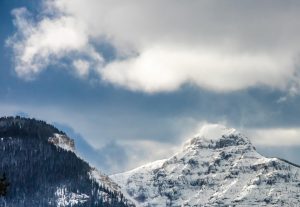
Snow swirls off the peak of a mountain top just outside of Cooke City, Montana as the sun peeks through the clouds.
My people on my father’s side fought their way from poverty in the gold mine districts of California; my grandfather on my mother’s side started training as a blacksmith, “sharpening steel” (tempering picks and crowbars) for miners in Butte, at the age of 14. We made our way, we lived in paradise, and we thought we owned it, that it was ours to use any way we wanted; we left a lot of wreckage. Now, some of us hope to reinvent the objectives of our society. We think we can do something about reinventing desire; we’ve had enough with the unforgivable damage.
Until very recently the West was an intellectual colony of the East, defined by a Dime Novel mythology, passive, waiting for some hero from bad literature to come save us.
Since the beginnings of any sort of society in the West, in mining camps like Butte and Leadville, in our rancher towns like Cheyenne, in Utah’s Mormon cities, in petroleum towns like Casper, we’ve had a ruling class that controlled the economy and notions of local identity. The Anaconda Company called the shots in Montana from its imperial headquarters in Butte for 70 years. All that time, the company owned every significant newspaper in the state.
The great timberland corporation, Champion, having ravaged the forests, is withdrawing from western Montana in just the way the international mining corporations got out of Butte. Loggers and millworkers have been beguiled into thinking their futures lie with the company, and now they’re being betrayed just as the miners were in Butte. The blue-collar culture of the old rough-handed West is dying (for the most part it is dead), but remnants remain powerfully alive in vast, sparsely populated rural enclaves like eastern Montana and Wyoming. Political views in those far counties are deeply conservative and protectionist, for good reason: People there think the world is passing them by, and it is.
My grandfather came of age in Butte; he spoke a language learned there, about metal and heat. The Finnish ceramic artist Rudy Autio grew up in Butte, hearing a half-dozen languages on the streets, with no idea he was living in the cowboy West. The West is a variety of cultures — Chicano sugar-beet farmers working the bottom lands outside Red Lodge, ballet dancers in Salt Lake City, and black-tie roulette croupiers in Elko.
But, as traditional industries fail, many of those cultures are being destroyed or absorbed into our increasingly homogenized nation, and we hate it. We hate to see our homeland losing its memories and its languages. We’re forgetting how to talk about going down in the mines. We’re becoming an out-West dress-up theme park; our children are learning the idiom of television.
Demographics are changing rapidly. Westerners, these days, mostly live in cities — Phoenix, Denver, Tucson, Salt Lake City, Boise, Las Vegas. Most of them grew up outside the region.
Because of our wide-open history, we’re taken to be a hideout for right- and left-wing loonies. We draw Aryan Nations fascists, Libertarians, anti-tax nuts, trip-wire Vietnam vets who think purity resides in the vicinity of wilderness, all of them imagining they can find sanctuary in some remnant of the old West (a very bad idea; the old West takes care of its own and mostly despises everyone else with xenophobic glee).
A fly-fishing friend picked Kalispell, Montana as the place where he would start his real-estate business. Right off, he sold an extremely valuable shoreline acreage on Flathead Lake to a young man who thought he was going to marry a woman who had become well known for acting in the movies — beautiful property for gorgeous people.
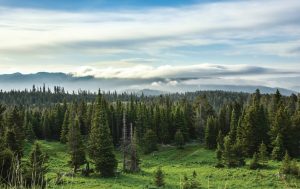
Post-sunrise low-lying clouds begin to burn off during this late spring morning in the Bridger Mountains of southwest Montana.
Some months later, my friend resold that property. Two commissions on the same place in the same year — a good year for my friend, although the romance had fractured. The gorgeous people had gone off separately.
The privileged congregate in their own enclaves, where they talk shop and admire each other. In the Mountain West they traditionally cluster in Aspen and Sun Valley, lately in Jackson, and now in Boulder River country and at the north end of Flathead Lake. They stimulate the local service economy and upscale restaurants, inspire gossip and magazine articles, but otherwise don’t amount to much in the social dynamic of the region.
Out-of-state retirees are another deal, multitudinous and disruptive. This round of immigration may be our last; this crowd may fill the country. They’ve already overwhelmed Oregon and Washington. The major industry in Oregon is not logging, it’s healthcare. The retirees are a last wave, coming our way, looking for places to hide, hoping they’ll have the luck to get by without directly encountering the violence resulting from the so perfectly justifiable anger of the disenfranchised in American cities like Los Angeles.
We wish this crop of outlanders would pay their way into our society. Many of the new in-migrants — the rich and the old — don’t see why they should have to pay taxes to live in the hinterlands. We can’t afford first-rate schools, and they don’t care. They sit tight in homogenous enclaves of the dying middle class. “When you get your first walled retirement community,” a bitter sociologist told me, “you’ll see the end of anything like actual neighborhoods.” By actual, I suppose he meant settlements where citizens work, raise children, and count on each other for all varieties of help, from picking huckleberries to burying.
We’re left with a dying traditional economy, a taxpayers’ revolt, and, some think, nothing in the way of a basis for a new economy other than tourism. Working people are leaving. They see themselves in the servant business, a sad career servicing tourists. It’s a sorry prospect.
Many Westerners understand that we inhabit a national culture dedicated to the creation of false desire (advertising and television constantly urging us to want some damned thing; we can never get enough, so we’re miserable). Westerners know from bitter experience that things can’t make us happy. It’s an old story — some soul starts buying new combines and pickup trucks — it’s a sure way to fail in the ranchland West. Most of us, not just schoolteachers and environmentalists but farm hands and timber fallers, yearn for more than hunting weaponry and whale-song CDs.
Westerners are coming to understand that we have to give up on economic growth as an ideal. We can’t continue on the same path; the world is used up in so many ways. We have to center our regional economy around notions of taking care and communality, making better use of what we’ve already got.
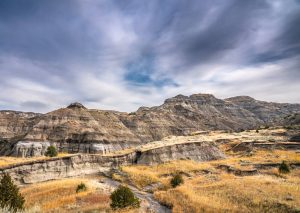
The ancient badlands of Makoshika State Park, just outside of Glendive, Montana, offer a starkly beautiful expanse on a fall day.
Brilliant young people from all over America are cropping up in the Northern Rockies, betting their futures on the West. Many come up with the idea of finding a life in connection to nature in some approximation of functional shape; they come for the skiing, the fishing, the wolves, and the wilderness, but most of all they come because they hope to take part in the creative life of an open society.
The word is out: The Mountain West is a community where you can participate and make a difference. We’re paying a lot of attention to people with ideas: naturalist writers like David Quammen and Terry Tempest Williams, revisionist historians like Patricia Nelson Limerick and Richard White, legal thinkers like Charles Wilkinson (students from his University of Colorado Law School classes seem bound to have enormous influence in the West for several decades), and our philosopher mayor in Missoula, Dan Kemmis, whose writing on communality is at the cutting edge of our thoughts about the future.
Every college town in the Rockies has an institute concerned with Western identity and policies, like the Center for the Rocky Mountain West in Missoula and the Center of the American West in Boulder. There’s a writer’s conference meeting every week of the summer in resort areas like Aspen; Yellow Bay on Flathead Lake; McCall, Idaho; Joseph, Oregon; or Park City, Utah. Ranchers and environmentalists get together in groups like the Northern Plains Resource Council and the Wyoming Outdoor Council. Groups ranging from Ross Perot’s populist/conservative United We Stand to radical environmentalists in the Alliance for the Wild Rockies and Earth First! are providing centers around which citizens can organize their thinking about the future. So are publications like Missoula’s Northern Lights and Colorado’s High Country News.
Our politicians, like politicians, don’t seem interested in much beyond some version of business as usual (to see our ruling class at work protecting the status quo, keep an eye on the current ranchland senators from Montana, Wyoming, and Colorado). Even so, many citizens in the West think it’s entirely possible to work (plan, think) our way into a strong regional economy without giving up on social justice or environmental sanity.
I’m a boy who started life on an outback cattle ranch in the deep West of southeastern Oregon, far from the centers of decision making in my society. So, I cannot tell you how much it means to me to find myself in association with people who are so deeply engaged in trying to define the processes of the right life, encode those processes in their laws, and live with them in an open society.
We struggle to name things we won’t relinquish, like compassion or old-growth forest or high times on Saturday night; we want to be done with cold-hearted deliberations and the empty-pocket blues; we want transcendent blue-sky mornings and turkey dinners with our old pals and sweet singing later on.
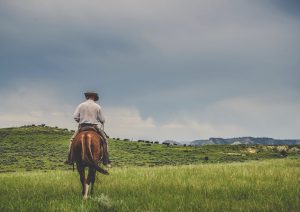
A cowboy rides off after a cattle branding at Rocker 6 Cattle Co. in Rosebud County, near Colstrip, Montana.
My true companion and I were shuffling through reefs of fallen leaves in luminous October light, heading for our yearly football game in the little stadium at the University of Montana above the Clark Fork River in Missoula. We exchanged shouts with three writers and some old downtown drinking cronies and talked shop with Dan Flores, the environmental historian. I rubbed shoulders with a famous rock-and-roll musician in the hot-dog line. It all led me to feel that I was at one with a society in which personal realization was more important than success.
Some sweetest times, for me, are warm afternoons when the autumn sky is blue-white and infinite in its distance from our concerns. The needles on the larch in the high country have gone gold, falling like glory on the logging roads. Cottonwood trees along the rivers bloom huge and pale yellow against the evergreen mountains, and we’re untouchable. We will never grow old; our people will never die. No one will break into our house while we’re gone. A long winter is coming. We’ll embrace it if we have a brain — ski, roll in the snow. (I, in my brainless way, head south.)
At the football game we rooted for our team, and it won. If my happiness about that seems excessively stupid, and I can understand that it might, I’m not very sorry. When we got home my front door was standing open but nothing was touched. Maybe it was the wind.
In Asia, people save themselves from sorrow by meditating on a paradise of their own inventing, which they call the Pure Land. Attempting to see each swirl in the river, leaf on the mountain slope, intricate butterfly in the sun, they try to find peace in the creature they are. In spring, the purple and white lilac will blossom in enormous clots of splendor along the alleyways in Missoula.
“If the weather holds,” I told my true companion, “we could live forever.” Or anyway give it a try. Memento vivere.



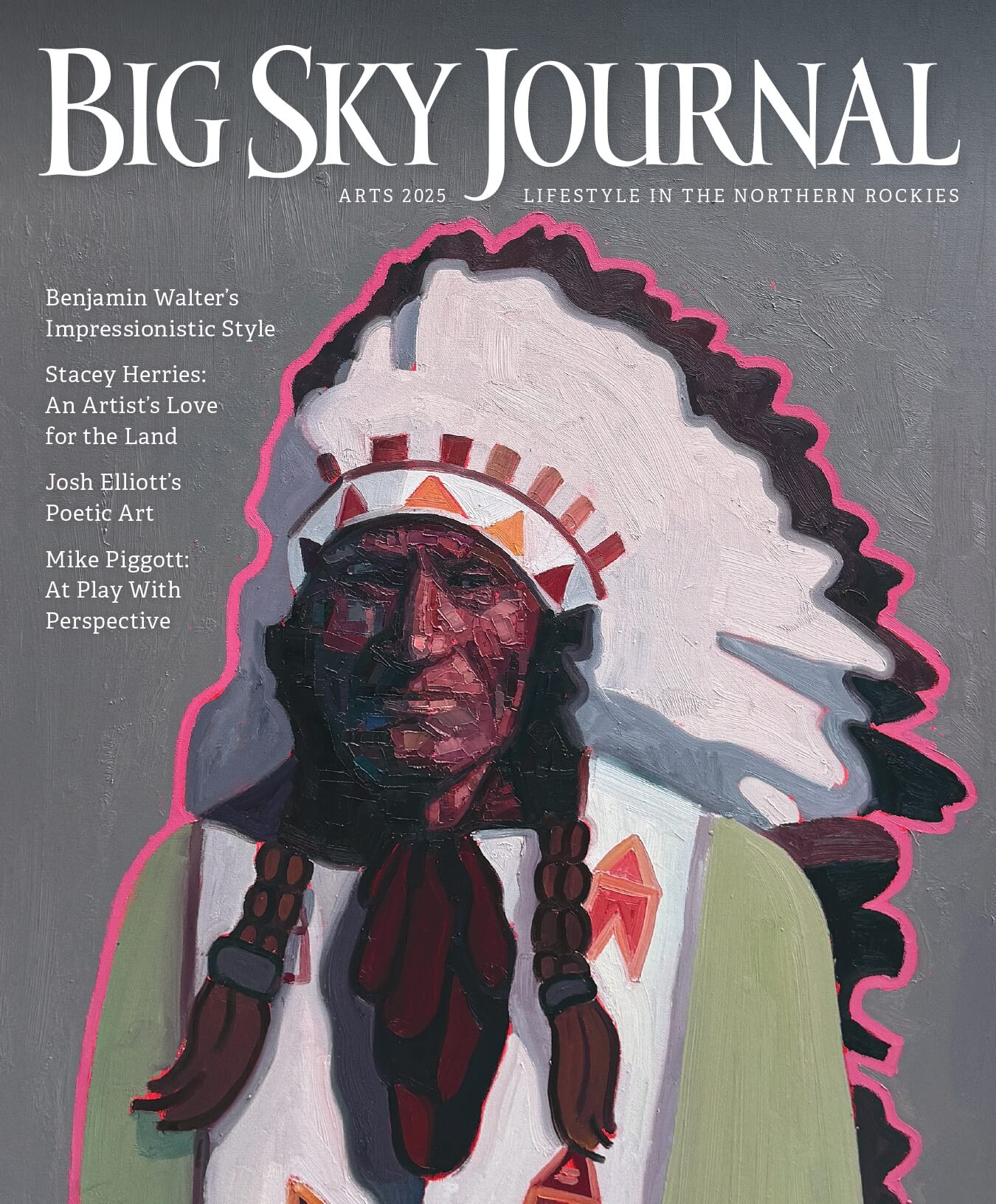
No Comments